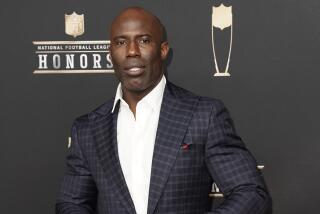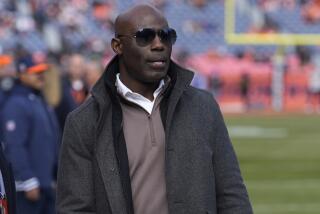Disabled State Official Alleges Bias by Airline : Courts: Lawsuit says United Airlines bumped rehabilitation director from flight because he uses respirator.
- Share via
SACRAMENTO — The state Department of Rehabilitation director has filed a federal discrimination lawsuit against United Airlines for keeping him off a flight early this year because he uses a portable respirator.
William Tainter, 49, who has used the breathing device since he contracted polio as a teen-ager, filed the suit late Monday in U.S. District Court here, asking for $250,000 in emotional damages from the airline and from an Arlington, Va., travel agency that booked the January, 1991, flight from San Diego to Chicago.
On Tuesday, Tainter said he filed the suit because he is tired of facing inquiries every time he flies. He said his aim is to force United and other major airlines to comply with federal regulations by following a coherent policy in how they treat people with disabilities.
“It’s ridiculous to have a situation where you have a person with a severe disability who has to travel as a result of the position he has,” said Tainter, “and every time he goes to the airport, it’s a constant hassle and it’s a crapshoot whether he is going to get on the plane or not.”
Tainter said he needs the respirator to force air into his lungs through a plastic hose he clamps in his mouth. At night, he attaches the hose to a tracheal tube so he can breathe while he sleeps.
In his lawsuit, Tainter alleges that United discriminated against him “solely on the basis of his handicap” on Jan. 12 when he was barred at San Diego’s Lindbergh Field from taking the respirator on what was supposed to be the first leg of a flight to Washington, D.C., to attend a conference of “prominent disabilities activists.” Tainter, who was appointed to his $99,800-a-year post in April, was director of the San Diego Community Service Center for the Disabled at the time.
The suit said Tainter booked the flight through USA International Travel Inc., an agency used by conference organizations. It said he asked the agency several times to make sure the airline knew his respirator used a “gel cell” battery.
Tainter and his Sacramento attorney, Ralph D. Black, maintain that federal aviation regulations approve the use of such a battery on flights because the acid in the unit is crystallized and will not spill. But the lawsuit says United’s regional supervisor of customer services determined the battery contained a hazardous substance and had to be left off the plane.
The dispute delayed takeoff, and the United agent called USAir, which agreed to take Tainter without any question, the suit alleges. While the suit says Tainter was never refused passage on previous United flights, it alleges that the airline has a “pattern and practice” of failing to inform its employees on how to handle handicapped passengers and their equipment.
The suit said Tainter was forced to cancel his first Washington meeting and that he was “not only humiliated, but . . . has been effectively precluded from further participation in airline travel promotion programs and the use of more convenient flights for his frequent travel.”
A United spokesman said he was unaware of the suit and declined comment. Attempts to reach the travel agency were unsuccessful.
More to Read
Inside the business of entertainment
The Wide Shot brings you news, analysis and insights on everything from streaming wars to production — and what it all means for the future.
You may occasionally receive promotional content from the Los Angeles Times.










